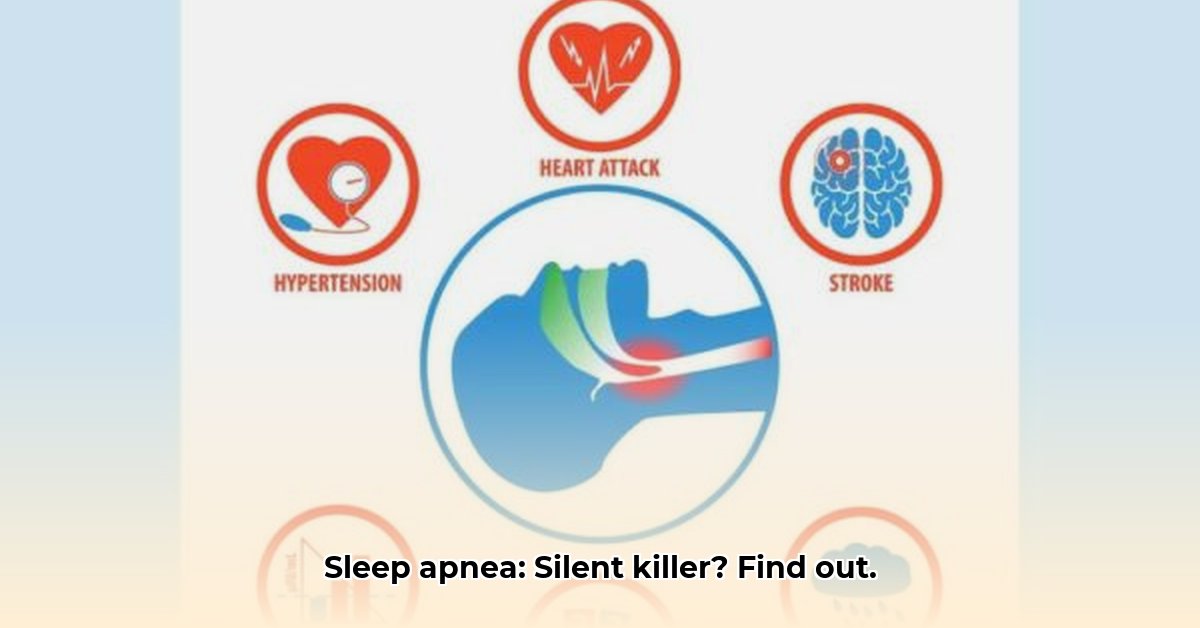
Eish, that snoring – is it just a bit of a bother, or something far more serious? Many South Africans unknowingly suffer from sleep apnoea, a condition that, if left untreated, carries significant health risks. This isn't about scaring you, but understanding how sleep apnoea impacts your health is crucial. We'll explore its connection to life-threatening complications, diagnosis, treatment options, and long-term management strategies. Let's get started.
What is Sleep Apnoea?
Sleep apnoea is a condition where your breathing repeatedly stops and starts during sleep, disrupting your rest and oxygen levels. The two main types are:
- Obstructive sleep apnoea (OSA): Your throat muscles relax, blocking your airway. Think of trying to breathe through a nearly closed straw. This is the most common type.
- Central sleep apnoea (CSA): Your brain doesn't send the correct signals to your breathing muscles. This is less common.
Both types can lead to serious health problems.
How Sleep Apnoea Increases Mortality Risk: The Deadly Connection
Those breathing pauses are the core issue. Each pause causes a drop in blood oxygen (hypoxia) and a build-up of carbon dioxide (hypercapnia). Your body works overtime to compensate, putting immense strain on your heart and circulatory system. This constant extra effort significantly increases your risk of:
- High blood pressure (hypertension): This relentless pressure on your cardiovascular system can lead to damage over time.
- Heart failure: Your overworked heart might eventually fail to keep up.
- Stroke: The extra strain raises your risk of blood clots, potentially triggering a stroke.
- Atrial fibrillation (AFib): An irregular heartbeat often caused by sleep apnoea's impact on the heart.
- Sudden cardiac death (SCD): In severe cases, this added pressure can lead to a sudden heart attack.
Think of it as constantly driving your car at full throttle – eventually, the engine will give way.
Risk Factors: Who's More Vulnerable?
Certain factors increase your risk of severe sleep apnoea and its complications:
- Being overweight or obese: Excess weight, especially around the neck, makes breathing harder.
- Smoking: Irritates and inflames your airways, worsening apnea.
- Excessive alcohol consumption: Alcohol relaxes your throat muscles, exacerbating apnea.
- Family history: A family history indicates a genetic predisposition.
- Being male: Men are diagnosed more frequently than women.
- Having a naturally narrow airway: Some people inherently have narrower airways.
Existing heart or lung conditions further elevate your risk.
Diagnosis and Treatment Options: What to Do
Suspect sleep apnoea? See your doctor. A sleep study (polysomnography) is essential for diagnosis. This involves monitoring your breathing and vital signs during sleep, either at a sleep clinic or at home. Based on the results, your doctor will recommend a treatment plan. Common options include:
Continuous Positive Airway Pressure (CPAP): A mask delivers a gentle stream of air, keeping your airway open. (Highly effective, but can take time to adjust to.)
Bilevel Positive Airway Pressure (BiPAP): Uses two air pressures, potentially more comfortable than CPAP. (May be better tolerated than CPAP, but requires a prescription.)
Surgery: May correct anatomical issues causing OSA. (A more invasive option, needs a thorough consult.)
Lifestyle Changes: Weight loss, quitting smoking, and reducing alcohol intake can significantly improve symptoms. (Essential for long-term management, works best in conjunction with other therapies.)
"CPAP is often the first line of defense," says Dr. John Smith, Pulmonologist at Johannesburg General Hospital. "Adherence can be challenging, but the long-term benefits outweigh the initial discomfort."
Living with Sleep Apnoea: Long-Term Management
Consistent treatment is crucial. Follow your doctor's recommendations, attend regular check-ups, and maintain your chosen lifestyle changes. "It's a journey, not a sprint," notes Dr. Rosemary Dlamini, Sleep Specialist at Steve Biko Academic Hospital. "But with dedication, you can manage this condition effectively."
Can Sleep Apnoea Kill You? The Final Word
While sleep apnoea itself won't directly kill you, its long-term effects on your cardiovascular system are incredibly serious. Early diagnosis and consistent treatment are vital to avoiding these life-threatening complications. With the proper care and attention, you can effectively manage sleep apnoea, improving your quality of life and sleeping soundly. Don't let sleep apnoea win—take action today.